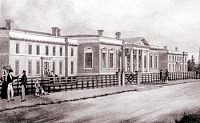Goldsworthy Lowes Dickinson (1862-1932)
 Englischer Schriftsteller, Humanist, Historiker,
Philosoph und Pazifist während des ersten Weltkrieges, der ihn, wie aus seinem
Büchlein "Briefe eines Chinesischen Beamten" hervorgeht, wohl kaum
überrascht hat. Später wirkte er bei der Konzeption der League
of Nations mit.
Englischer Schriftsteller, Humanist, Historiker,
Philosoph und Pazifist während des ersten Weltkrieges, der ihn, wie aus seinem
Büchlein "Briefe eines Chinesischen Beamten" hervorgeht, wohl kaum
überrascht hat. Später wirkte er bei der Konzeption der League
of Nations mit.
Er wurde vor allem für "The International Anarchy, 1904–1914"
(1926) und "The Greek View of Life" (1896), bekannt.
Die "Briefe eines chinesischen Beamten" veröffentlichte er 1901 in
London unter dem Pseudonym John Chinaman, 1903 in New York anonym.
Johnathan D. Spence schreibt darüber:
Dickinson was dejected by the ugliness and cruelty and
insensitivity of the world that lurked just outside Cambridge; how could the
Athenian ideals be preserved in such an appalling environment? Those men who
valued decency, honesty and compassion must state their values clearly lest the
new Englishman—"Divorced from Nature but unreclaimed by Art; instructed,
but not educated; assimilative, but incapable of thought"—inherit the
earth. [...]
As Dickinson warmed to the theme the inspirations came thicker,
until his critique of his own society, his affection for his young friends, and
shreds from the Chinese poets he had read in translation, all merged into a
remarkable hymn to Chinese humanism, written in the first person by "John
Chinaman" himself:
In China. … To feel, and in order to feel to express, or at
least to understand the expression of all that is lovely in Nature, of all
that is poignant and sensitive in man, is to us in itself a sufficient end. A
rose in a moonlit garden, the shadow of trees on the turf, almond bloom, scent
of pine, the winecup and the guitar; these and the pathos of life and death,
the long embrace, the hand stretched out in vain, the moment that glides for
ever away, with its freight of music and light, into the shadow and hush of
the haunted past, all that we have, all that eludes us, a bird on the wing, a
perfume escape on the gale-to all these things we are trained to respond, and
the response is what we call literature. This we have; this you cannot give us;
but this you may so easily take away.
It is remarkable enough that William Jennings Bryan should have
taken these letters literally, and written a stirring rebuttal (published in
1906), in which he defended Labor-saving Machinery, The Home and Christianity.
But what is perhaps even more remarkable is that Dickinson—the political
scientist and expert in comparative governments—could visit Peking in 1913 and
come away with his fantasy confirmed as reality! As he wrote to E. M. Forster:
"China! So gay, friendly, beautiful, sane, hellenic,
choice, human … Yes, China is much as I imagined it. I thought I was
idealizing, but now I doubt it."
Dickinson's Arbeit am King's College (Bild) der University of Cambridge
charakterisiert Spence so:
... Goldsworthy Lowes Dickinson-known as Goldie to generations
of students-still presided over young minds, inculcating the virtues of an
esthetic humanism which are the heart of what people came to know as
"Bloomsbury," virtues that were permanently captured in the essays and
novels of E.M. Forster.
 Letters
from a Chinese Official
Letters
from a Chinese Official
 The
Greek View of Life
The
Greek View of Life
 Archive Centre Catalogue, King's College, Cambridge
Archive Centre Catalogue, King's College, Cambridge
 Englischer Schriftsteller, Humanist, Historiker,
Philosoph und Pazifist während des ersten Weltkrieges, der ihn, wie aus seinem
Büchlein "Briefe eines Chinesischen Beamten" hervorgeht, wohl kaum
überrascht hat. Später wirkte er bei der Konzeption der League
of Nations mit.
Englischer Schriftsteller, Humanist, Historiker,
Philosoph und Pazifist während des ersten Weltkrieges, der ihn, wie aus seinem
Büchlein "Briefe eines Chinesischen Beamten" hervorgeht, wohl kaum
überrascht hat. Später wirkte er bei der Konzeption der League
of Nations mit.